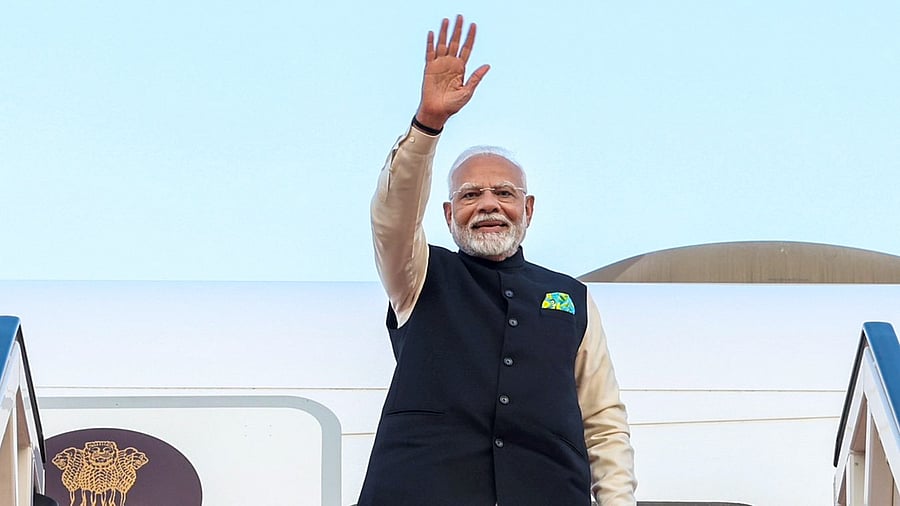
Prime Minister Narendra Modi.
Credit: PTI File Photo
New Delhi: Even as the tension between Tokyo and Beijing escalated over China’s proposed “Victory Day” parade on September 3 to mark the 80th anniversary of Japan's surrender in World War II, Prime Minister Narendra Modi left New Delhi on Thursday for a visit to both East Asian nations.
The prime minister, however, will not attend the ‘Victory Day’ parade in Beijing on September 3 – an event which Tokyo accused China of planning with overtones against Japan.
Modi will meet Prime Minister Shigeru Ishiba of Japan on Friday and Saturday. Ishiba is expected to convey to Modi that Japan has decided to raise the target for private investment in India to 10 trillion yen ($68 billion) over the next 10 years, raising it from 5 trillion yen agreed upon in 2022. They will renew the India-Japan Joint Declaration on Security Cooperation and call for a free and open Indo-Pacific, sending a message against The two leaders are also expected to convey concerns over China’s aggressive moves in the East China Sea and the South China Sea and call for “safety and security of the maritime domain, freedom of navigation and overflight, unimpeded lawful commerce and peaceful resolution of disputes with full respect for legal and diplomatic processes in accordance with international law, particularly the United Nations Convention on the Law of the Sea (UNCLOS).
Modi on Thursday said that he and Ishiba would “endeavour to give new wings” to India-Japan collaboration, “expand the scope and ambition of economic and investment ties, and advance cooperation in new and emerging technologies, including AI and Semiconductors”.
The prime minister will fly to Tianjin in northern China on Saturday and will have a bilateral meeting with Chinese President Xi Jinping on Sunday, before attending the summit of the Shanghai Cooperation Organisation on Monday. He may also have a bilateral meeting with Russian President Vladimir Putin before flying back to New Delhi on Monday.
Modi will meet Xi and Putin even as New Delhi’s relations with Washington, D.C., came under stress with President Donald Trump imposing a 50% tariff on all exports from India to the United States, including 25% for India’s continued energy import from Russia, in defiance of the sanctions imposed by the West targeting the former Soviet Union nation in the wake of its “special military operations” in Ukraine.
Unlike Putin, Pakistan Prime Minister Shehbaz Sharif and a few other SCO leaders, Modi will not stay back to join the several other foreign leaders, who will fly to witness the military parade to be held in Beijing to mark the 80th anniversary of the victory in China’s war of resistance against aggression by Japan and the “World Anti-Fascist War” (WW II).
Tokyo reached out to other nations over the past few weeks, underlining that China had planned the commemorative events on September 3 with overtones against Japan and that the foreign leaders should carefully consider whether they should take part in the events.
China reacted sharply and stressed that Japan should face squarely and reflect on its history of aggression with sincerity.
“India remains committed to working with the SCO members to address shared challenges and deepen regional cooperation,” Modi said before leaving New Delhi for Tokyo.
Modi’s bilateral meeting with Xi on the sidelines of the SCO summit at Tianjin in China is the second between the two leaders in a year. They had earlier met on the sidelines of the BRICS summit at Kazan in Russia on October 23, 2024, just two days after a deal on patrolling at Depsang and Demchok had marked the end of the four-and-a-half-year-long military stand-off along the Line of Actual Control in eastern Ladakh.
Though the stand-off along the LAC in eastern Ladakh had brought India-China relations to a new low between April-May 2020 and October 2024, the two sides, over the past 10 months, have made attempts to bring the ties back on track.
“India remains committed to working with the SCO members to address shared challenges and deepen regional cooperation,” Modi said before leaving New Delhi for Tokyo. “I also look forward to meeting President Xi Jinping, President Putin and other leaders on the sidelines of the summit.”
“I am confident that my visits to Japan and China would further our national interests and priorities, and contribute to building fruitful cooperation in advancing regional and global peace, security, and sustainable development, Modi said on Thursday.
